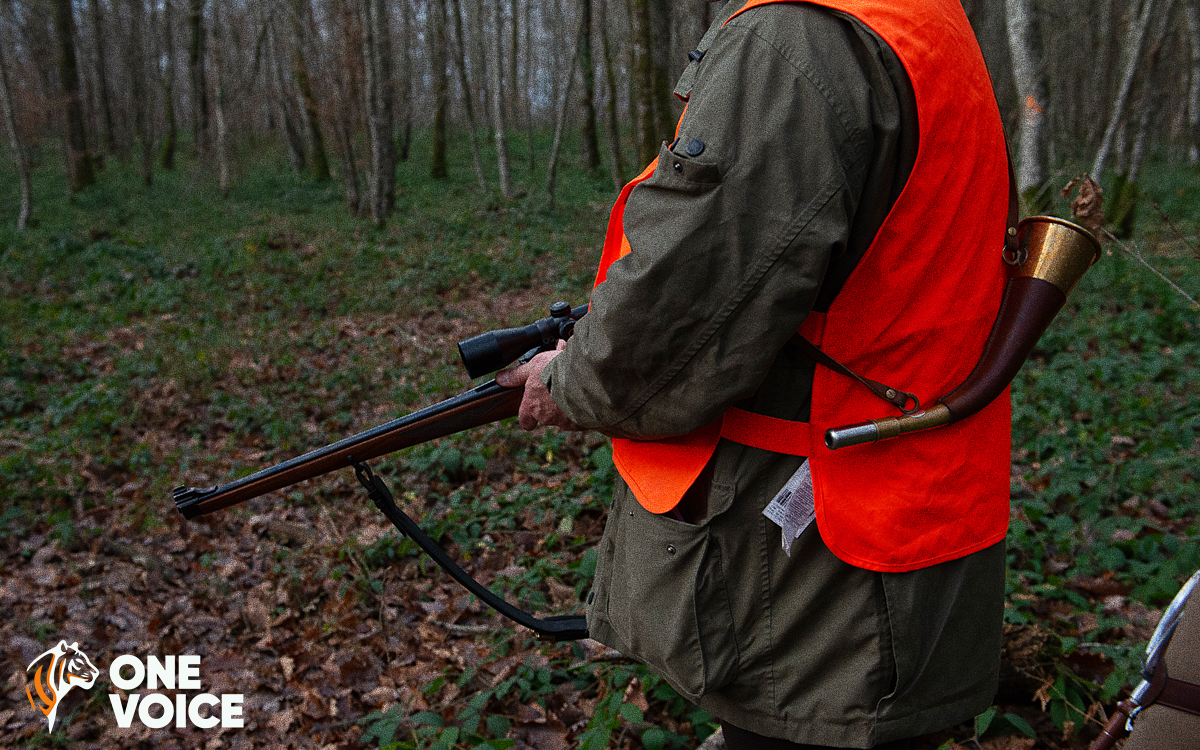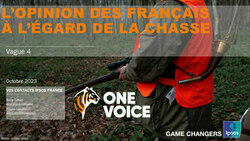
Ipsos survey for One Voice 2023. French people and hunting: the gap is increasing
One Voice has, in October 2023, published the fourth gauge of French people’s opinions regarding hunting, carried out by the Ipsos Institute* (the previous ones are dated 2018, 2021, and 2022). The percentage of French people declaring themselves in opposition of hunting has reached the highest ever seen (53%), which is an increase of five percent in one year. For the first time, the majority of people living in rural areas have said that they oppose hunting. Having been committed for almost thirty years to a single vision for animals, humans, and the planet, One Voice is delighted with this growing dislike between French people and hunting, born from an awareness of what this hobby is: a deadly problem. An analysis of the results.
Deploying a varied legal arsenal for animals…
One Voice (alone or with its partners) has recently won many legal victories against the State on a local and/or national level: the repeated suspension and cancellation of decrees for traditional and glue hunting, the one authorising the digging out of badgers in the period surrounding reproduction, and the protection of bears just to mention the main ones.
Among the cases in progress is the defence of protected species such as mountain Galliformes, but also the unloved: those species that are labelled as ‘likely to cause damage’ (ESOD in French).
… and humans
Guaranteeing safety for walkers and countryfolk in their entirety is also an essential consideration for the One Voice team (as it is for 89% of respondents to the survey who believe that hunting poses safety issues). Also, proceedings at the State Council have been initiated to ask the Prime Minister to do what is needed as quickly as possible. French people approve measures to ban or control hunting, specifically the implementation of an annual medical check with an eye test (93%), but also a ban on hunting for two days a week and during the school holidays (85%). Why not do this?
This survey allows us to objectify the population’s massive support for all of these fights.
Below, you can find the main lessons from the survey, and at the bottom of the page, the results in the form of a graph with a comparison of the results for previous measures for the issues concerned.
The main lessons
- The percentage of French people declaring themselves in opposition of hunting has reached the highest ever seen (53%), which is an increase of five percent in one year. For the first time, the majority of people living in rural areas state that they are opposed to this practice.
- Specifically, hunting is always associated with several negative views, in particular when it comes to safety for walkers (89% believe that it poses safety problems).
- Despite this negative perception, French people continue to share certain arguments in favour of hunting and specifically the idea that it can have a useful role in controlling wildlife.
- Critical of hunting, French people approve measures to ban or control it, specifically the implementation of an annual medical check with an eye test (93%), but also a ban on hunting for two days a week and during the school holidays (85%).
The share of people opposing hunting reaches an unprecedented level
After a slight decrease in 2022, the share of French people stating that they oppose hunting has reached its highest level (53%, of which 25% say that they are completely opposed to hunting). This proportion is 5 percent higher in relation to 2022. We have also seen a decrease in the number of respondents stating that they are indifferent to this issue (22%, down by 4%). For the first time, this opposition to hunting has become a majority among those living in rural towns (51%, an increase of 3%).
The perception gap between men and women on the subject of hunting has reduced this year. Although there are still more women who state that they are opposed to this practice (60% versus 45% of men), this proportion has remained relatively stable (increased by 1%) while the men’s has significantly increased (up by 8%).
Specifically, hunting is still associated with negative views
Hunting is still perceived by the vast majority of respondents (89%, up by 2 percent) to pose safety issues for walkers during their strolls in nature, with 58% even being completely in agreement with this idea.
This safety issue was experienced in concrete terms by a large number of French people. 74% of them also stated that they were already concerned by the possible presence of hunters while they were walking in the forest, and 73% have already avoided walking in the forest or in certain areas for fear of a hunting accident. This concern is experienced even more strongly for those residing near a hunting area (respectively 81% and 80%, an increase in relation to 2022).
At the same time, hunting is not considered to be a hobby like any other (64% do not believe that this is the case) and seven in ten French people associate it as a cruel practice (an increase of 5% in one year).
This negative perception is often shared by women, but a clear majority of men also believe that hunting poses safety issues and deem it a cruel practice. On the other hand, we see few differences between those living in rural and urban towns.
Hunting also represents a risk for the environment. For 82% of French people, the amount of lead generated by hunters’ shots is a significant threat to nature, with 39% even believing that it is a very significant threat. Young people are shown to be the most sensitive on this subject: 89% of those under 35 years old believe that it is a significant threat, versus 75% of those over 60 years old.
However, some arguments in favour of hunting are still subject to approval by French people
Although French people have a negative perception of hunting, they still agree with some arguments in its favour. First of all, they believe that it can have a useful role. 66% believe that it allows animal populations to be managed, and 60% believe that it allows ‘damage’ caused by wildlife to be limited.
Those residing in rural areas have more of tendency to find a useful role in hunting: 72% of them believe that it allows animal populations to be managed (versus 64% of those living in urban areas) and 67% believe that it allows ‘damage’ caused by wildlife to be limited (versus 58%).
Beyond this useful aspect, hunting is associated with a rural way of life by 62% of French people, with no big difference between urban and rural people: 65% of those living in rural areas share this idea versus 61% of those living in urban areas.
Measures aimed at supervising hunting are still largely voted for
With the majority in agreement with critical arguments regarding hunting, French people approve measures aiming for a better control of the practice by a large majority. The majority of them state that they are favourable towards the implementation of each measure, and for most of those people, a majority even state that they are completely for it.
The measure that was most voted for is the establishment of an annual medical check visit, with an eye test, for a hunting licence (93% are for, of which 72% are completely for), ahead of a ban on penned hunting (92%, of which 79% are completely for), and a ban on hunting in protected areas (91%, of which 70% are completely for). Regarding these three elements, we note an increase in agreement (respectively up by 1%, 13%, and 3% in relation to 2022).
Another measure that sparks approval by the vast majority of French people is a ban on hunting or trapping for two days per week and during the entirety of the school holidays (85% are for this, an increase of 4%, of which 59% are completely for it).
A ban on hunting with horses and hounds is also supported by the vast majority of respondents (83%, of which 61% are completely for it), just like the ban on hunting animals in their burrows (84%, of which 57% are completely for this), or breeding animals that are destined to be released for hunting (78%, of which 54% are completely for this).
The ban on exemptions allowing lethal shots on wolves or scaring shots on bears was approved by the majority of respondents (70% and 64% respectively), but in these two cases only a minority of respondents stated that they were completely against it (43% and 37%).
Beyond these different measures, a vast majority of French people are in agreement with the principle of banning hunting in regions that have suffered from drought this summer (87% are in agreement, of which 53% state that they are completely in agreement). Although those living in rural areas are mainly for, they show that they are less favourable of this ban than those living in urban areas (81% versus 89%).
* The Ipsos survey was carried out from 4 to 6 October 2023 with 1000 people, comprising a national representative sample of the French population aged from 18 to 75 years old. The group was asked via the Internet using Ipsos’ Access Panel Online (quota method: sex, age, profession of the person being questioned, urban area category, region).

Detailed results of the survey
Translated from the French by Joely Justice